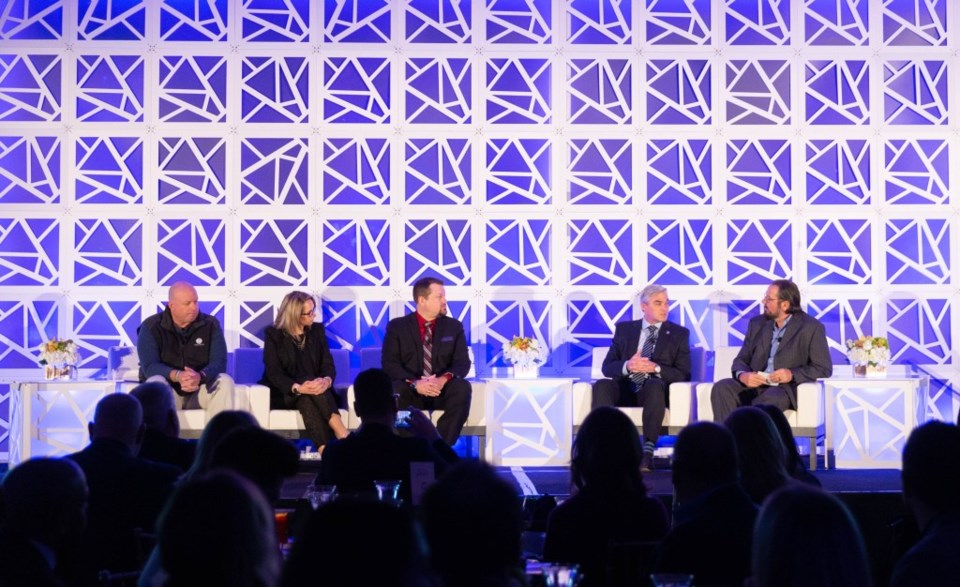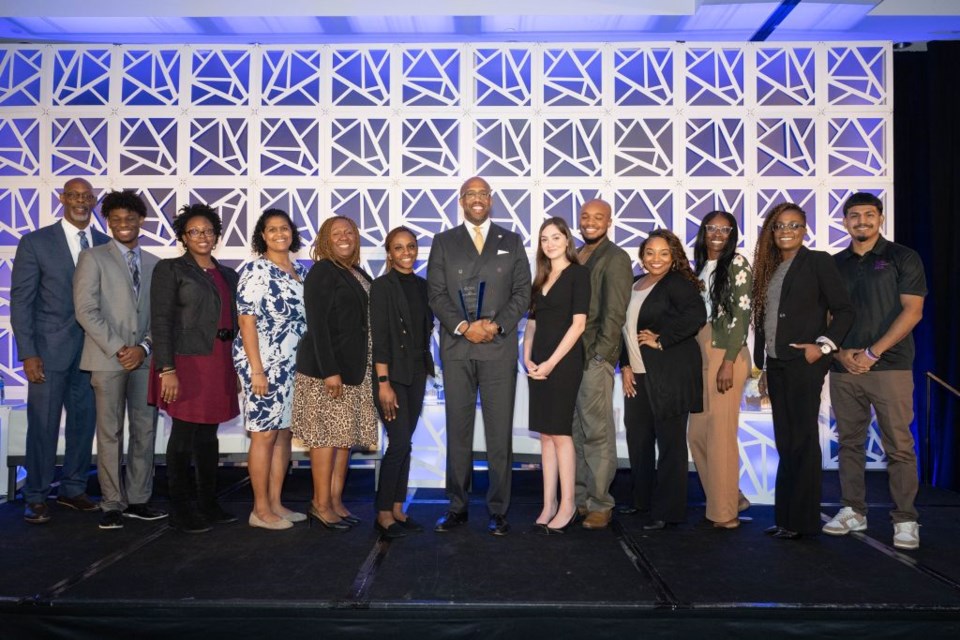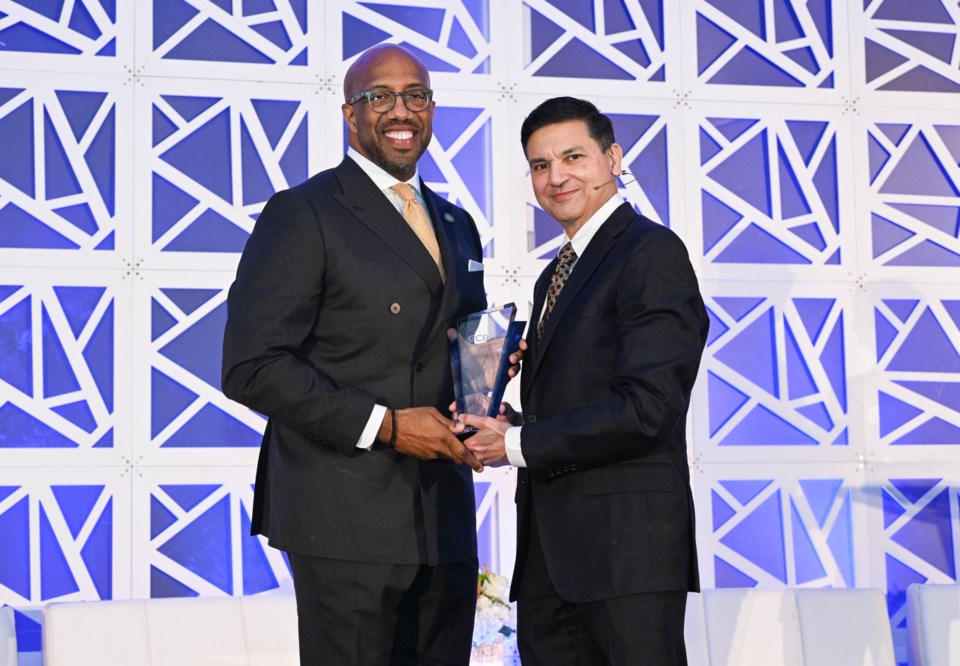At the Collin County Business Alliance 11th anniversary luncheon, the Leadership Award recipient was announced, and Collin County mayors discussed what the future looks like for their cities.

CCBA Chairman Sanjiv Yajnik introduced Dr. Micheal J. Sorrell, the president of Paul Quinn College, as the Leadership Award recipient. Dr. Sorrell spoke of Paul Quinn’s historically Black heritage while also discussing the future goal of expanding the urban-work colleges globally. He said that this would be done to help dismantle intergenerational poverty. Dr. Sorrell also explained how Collin County welcomed Paul Quinn and the college’s mission, thanking CCBA for their welcoming nature. Dr. Sorrell noted that people initially questioned the college’s expansion to Collin County.
“And what they meant in a very not so subtle way is that there wasn’t a place for us out here,” Dr. Sorrell said. “And let me tell you how wrong they were.”
Dr. Sorrell explained that Collin County revitalized the American Dream for a college where 75% of the students are attending under the Pell Grant, that Collin County welcomed and aided an underserved community and institution.
“We have been welcomed here with open arms, our students have been welcomed,” he continued. “What was so important about the way you welcomed them is that it allowed them to see themselves differently from the way in which they’d been taught to see themselves.”
Like Dr. Sorrell, Collin County leaders expressed their hope for the future in the county in a discussion panel led by Scott Flannery, CEO of UnitedHealth for North Texas and Oklahoma. The panel included the mayors of cities Celina, Wylie, Princeton and Prosper, Texas.
Princeton Mayor Brianna Chacon expressed how change happens at the local level. “This is where we make the changes, this is the grassroots effort that changes and molds forever,” said the mayor.
Mayor Chacon continued to explain how change is being made in Princeton through diversity, equity and inclusion (DEI) efforts such as DEI education and a DEI council that works with businesses. She said this aids in breaking down political divides.
“It’s breaking down, unfortunately, political divides that have been built all over,” said Mayor Chacon. “And again, as we said, that starts here locally and that’s our responsibility to break those divides down and make sure that everyone is operating the same.”
In addition to this, Mayor Chacon mentioned how Princeton is looking forward to being more business friendly, addressing the housing crisis and establishing infrastructure updates such as a new communications tower and a medical district in the coming years.

Celina Mayor Sean Terry also is looking forward to updating the infrastructure of the downtown of Celina while honoring the history of the town.
Mayor Terry said that this reinvestment will be done in the next year by revitalizing the downtown streets and putting in drainage that did not exist ten years ago into these streets. He added that successful changes in Celina in the past came from fostering private-public partnerships in which private institutions, such as businesses, come to public institutions like local government, with an understanding of each other’s needs.
But that is not the only challenge facing Celina. Like his fellow civic leaders, Mayor Terry recognizes political issues at the local level due to a lack of engagement from people just settling into Celina. “I think our biggest challenge in Celina right now is, when you're moving 500-600 people in, the new people coming in don't understand who they are voting for,” he said. “And I think it's huge to get out and get our citizens to engage.”
Prosper Mayor David Bristol, also said the town is looking to build an investment in the community and the infrastructure in the coming years. “Most of the people that are moving to Prosper, they are coming from someplace else,” said the mayor, “Building our sense of community as a small town-feel, we need to integrate all those people into our small town.”
Investment in the infrastructure of the town could help the city successfully grow. According to Mayor Bristol, the city is focusing on road-building that allows for better access to larger surrounding towns like Mckinney and attracting more businesses and more job opportunities.
“We’ve got 60 million dollars of road work going in right now,” said Mayor Bristol. “We've got our ISD building new schools, a new high school and we’ve got to get a road built out there. So, that’s our biggest thing, roads of all sorts.”
Wylie Mayor Matthew Porter looks to the future by looking for solutions to problems today. The mayor said that Wylie partnered with a private entity to create Jericho Village, which focuses on serving those who face housing issues, primarily those fleeing domestic abuse. Mayor Porter said that it provides not just a place to live, but opportunities to further education and career, get childcare and transportation assistance and counseling services.
“It’s a holistic approach…about ensuring that those individuals don’t slip through the cracks and that it doesn’t become a generational issue,” said Mayor Porter.
Overall, the mayors of Collin County emphasized improving the quality of life for all their residents by revitalizing and expanding the infrastructure and introducing new businesses to the area without losing focus on the people who live there, their constituents. Collin County is looking towards the future without leaving anyone behind.




